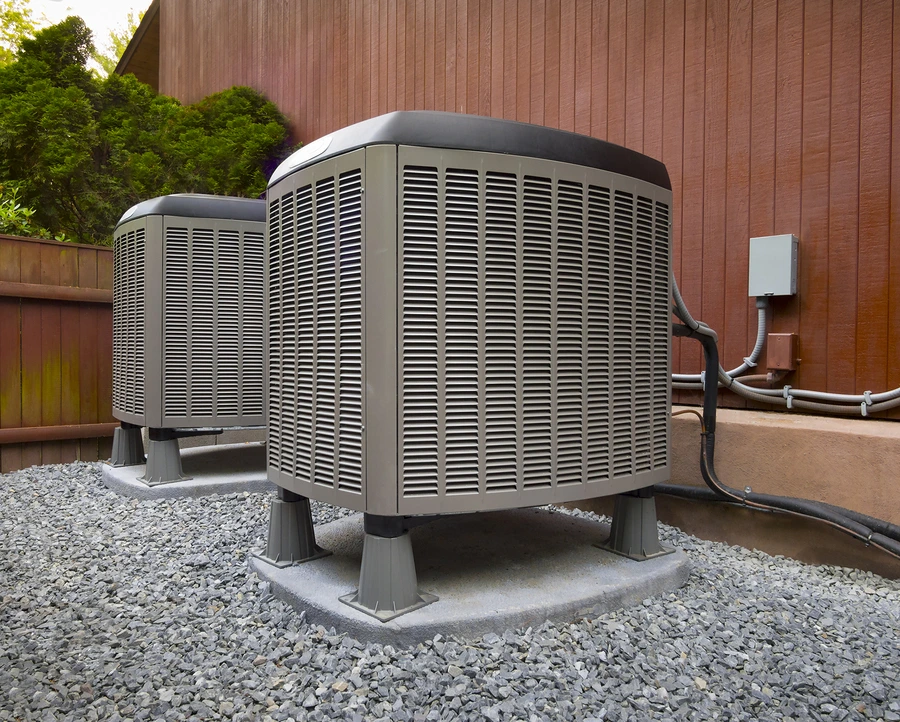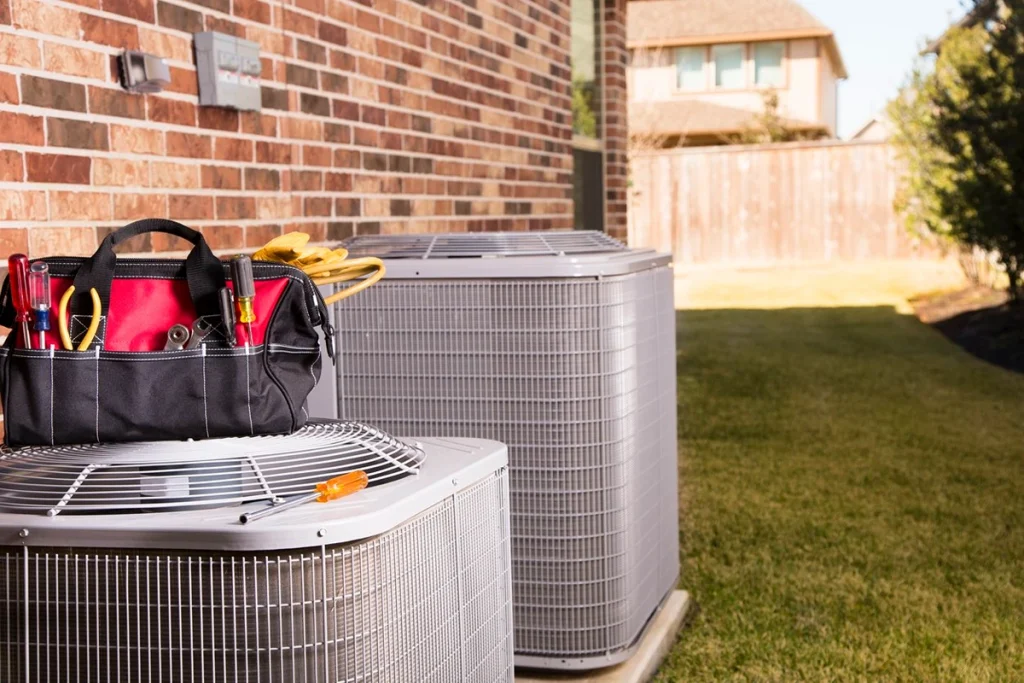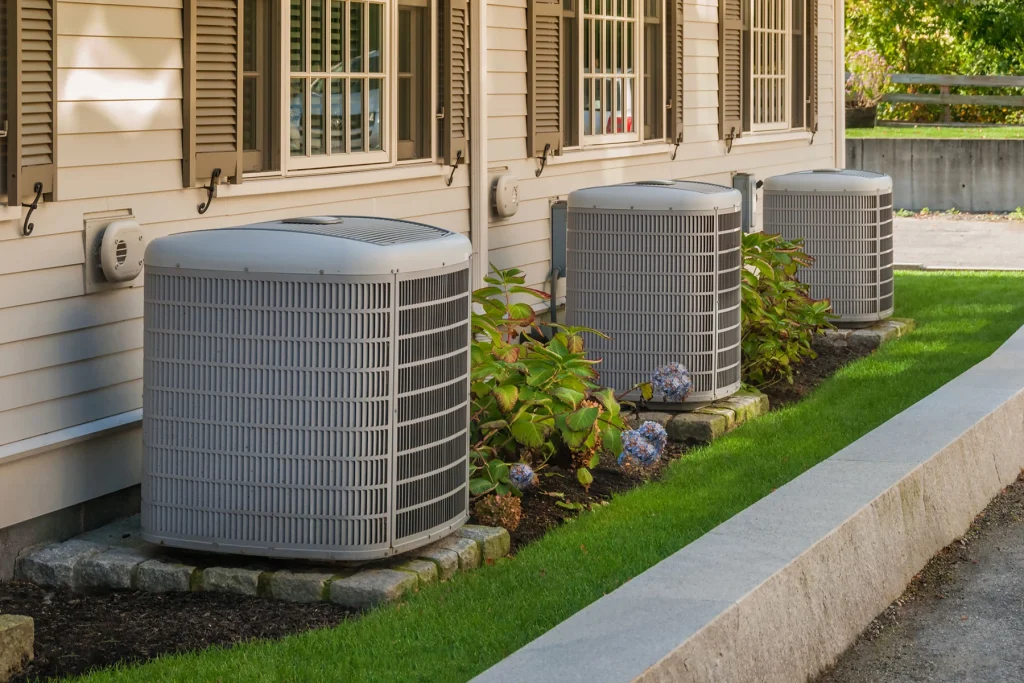Is your heating system ready for the unpredictable Scottish weather? With energy costs rising and climate concerns looming, finding an efficient and cost-effective solution is essential. Enter the hybrid heat pump, a cutting-edge technology combining air source heat pumps with traditional gas or oil boilers. This blog post dives into the mechanics, benefits, and installation process of hybrid heat pumps, providing a comprehensive guide for Scottish homeowners. Discover how this innovative system can offer consistent warmth and reduce your energy expenses year-round. Ready to transform your home’s heating efficiency? Let’s explore further.
What is a Hybrid Heat Pump?
A hybrid heat pump combines an air source heat pump with a traditional gas or oil boiler. The air source heat pump extracts heat from the outside air and uses it to provide heating and hot water. When the outside temperature drops too low for the heat pump to operate efficiently, the gas or oil boiler kicks in to ensure consistent heating and hot water supply.
The system’s operational mechanics revolve around selecting the most efficient and cost-effective energy source available. The hybrid heat pump automatically switches between using the air source heat pump and the boiler based on real-time energy tariffs and outdoor temperature. This ensures that homeowners benefit from lower energy costs and improved efficiency without sacrificing comfort.
Benefits of combining heat pumps with traditional boilers include:
- Consistent Heating: Ensures a reliable heating source, even in extremely cold weather.
- Energy Efficiency: Optimises energy use by switching to the most efficient source.
- Cost Savings: Reduces energy bills through intelligent energy source selection.
- Flexibility: Compatible with existing heating systems, minimising installation disruption.
- Environmental Impact: Lowers carbon emissions by utilising renewable energy when possible.
Operational efficiency in Scotland’s variable weather conditions highlights the hybrid heat pump’s adaptability. During milder conditions, the air source heat pump can operate efficiently, reducing the reliance on fossil fuels. When temperatures plummet, the boiler provides the necessary backup, ensuring that homes remain warm without excessive energy consumption. This dual approach makes hybrid heat pumps particularly suited for Scotland’s climate, balancing efficiency and reliability throughout the year.
Benefits of Hybrid Heat Pumps in Scotland
Hybrid heat pumps offer significant advantages in terms of energy efficiency and lower consumption. By combining an air source heat pump with a traditional gas or oil boiler, these systems ensure optimal energy use. The air source heat pump operates efficiently during milder temperatures, reducing the reliance on fossil fuels. When the temperature drops too low for the heat pump to function effectively, the boiler kicks in to maintain consistent heating. This dual functionality ensures that homeowners can enjoy lower energy bills without compromising on comfort.
The flexibility and suitability of hybrid heat pumps for Scotland’s climate make them an excellent choice. Given the region’s often harsh and variable weather conditions, the ability to switch between energy sources is invaluable. Hybrid systems are designed to automatically select the most efficient and cost-effective energy source based on real-time conditions. This adaptability ensures that homes remain warm even during the coldest months, making hybrid heat pumps particularly fit for Scotland’s demanding climate. Furthermore, these systems can be integrated with existing heating infrastructure, minimising the need for extensive modifications.
| Advantage | Explanation |
| Consistent Heating | Reliable heating source even in extremely cold weather. |
| Energy Efficiency | Optimises energy use by switching to the most efficient source. |
| Cost Savings | Reduces energy bills through intelligent energy source selection. |
| Flexibility | Compatible with existing systems, minimising installation disruption. |
| Environmental Impact | Lowers carbon emissions by utilising renewable energy when possible. |
The environmental impact and decarbonisation potential of hybrid heat pumps are substantial. By leveraging renewable energy sources when available, these systems significantly reduce carbon emissions. This contributes to the decarbonisation of domestic heating, aligning with broader environmental goals and regulations in Scotland. Additionally, the improved energy efficiency of hybrid heat pumps helps reduce overall energy consumption, further supporting sustainability efforts. This makes hybrid heat pumps a forward-thinking and eco-friendly solution for heating homes in Scotland.
Installation Process of Hybrid Heat Pumps in Scotland

The cost of installing a hybrid heat pump in Scotland ranges from £10,250 to £18,550. Government grants, such as the Home Energy Scotland Loan, can significantly reduce these costs by providing up to £7,500 in financial assistance. This makes the overall investment more manageable for homeowners. By leveraging these grants, many Scots can take advantage of the long-term savings and environmental benefits offered by hybrid heat pumps.
The general installation process for hybrid heat pumps involves several key steps. Firstly, a site survey is conducted to assess the suitability of the property for a hybrid heat pump. This includes evaluating the existing heating system and determining the best location for the new equipment. Following the survey, the installation itself involves mounting the air source heat pump unit outside and connecting it to the existing boiler system inside. This process is relatively straightforward and can be completed in both free-standing homes and flats, making hybrid heat pumps a versatile option for various property types.
- Site Survey: Assess property suitability and evaluate existing heating system.
- Equipment Mounting: Install the air source heat pump unit outside.
- System Integration: Connect the heat pump to the existing boiler system.
- Testing and Commissioning: Ensure the system operates efficiently and effectively.
The upcoming ban on gas boilers in new buildings, set to take effect next year, has significant implications. This regulation aims to reduce carbon emissions and promote the adoption of renewable energy sources. As a result, hybrid heat pumps will become an increasingly attractive option for new constructions. Builders and homeowners will need to consider alternative heating solutions that comply with the new regulations. Hybrid heat pumps, with their ability to provide efficient heating while leveraging renewable energy, are well-positioned to meet these future requirements.
Cost-Benefit Analysis of Hybrid Heat Pumps in Scotland
Replacing a G-rated gas boiler with a hybrid heat pump can result in significant annual savings. Homeowners can save approximately £296 per year on energy bills due to the increased efficiency of hybrid systems. Hybrid heat pumps reduce running costs by optimising energy use and lowering consumption. By switching between an air source heat pump and a traditional boiler, these systems ensure that the most cost-effective energy source is used at all times. Additionally, hybrid heat pumps contribute to lower emissions, making them environmentally beneficial.
The financial benefits of government grants further enhance the affordability of hybrid heat pumps. In Scotland, schemes such as the Home Energy Scotland Loan and the Boiler Upgrade Scheme can provide substantial financial support. These grants can reduce installation costs by up to £7,500, making the initial investment more manageable. The combination of annual energy savings and financial assistance from grants highlights the cost-effectiveness of hybrid heat pumps. This dual approach not only lowers the upfront costs but also ensures long-term financial benefits for homeowners.
| Cost Factor | Estimated Amount |
| Annual Energy Savings | £296 |
| Installation Cost | £10,250 – £18,550 |
| Government Grant Reduction | Up to £7,500 |
| Net Installation Cost | £2,750 – £11,050 |
Local Suppliers and Installers in Scotland
Valence Group stands out as a major supplier and installer of hybrid heat pumps in Scotland. With a market presence spanning over 60 countries and a customer base exceeding 30 million, they are a reliable choice for central heating appliances. Their extensive experience and expertise make them a go-to option for homeowners looking to install hybrid heat pumps. Valence Group provides comprehensive installation services, ensuring that the transition to a hybrid heating system is seamless and efficient.
Home Energy Scotland offers invaluable support for those considering hybrid heat pump installations. They provide free and impartial advice on energy efficiency and can generate tailored energy reports for individual households. This guidance helps homeowners make informed decisions about their heating solutions. Additionally, Home Energy Scotland can assist in identifying available grants and financial incentives, further reducing the overall cost of installation. Their comprehensive support ensures that homeowners have access to the best possible information and resources.
- Fill Out a Form: Submit a single form to receive up to four quotes for heat pump installation.
- Consult Home Energy Scotland: Get free and impartial advice, along with tailored energy reports.
- Identify Financial Support: Explore available grants and financial incentives to reduce installation costs.
Government Incentives and Grants for Hybrid Heat Pumps

The Boiler Upgrade Scheme (BUS) grant is a significant government incentive designed to reduce the costs associated with installing hybrid heat pumps. Homeowners can receive up to £7,500 off the initial installation costs, making this advanced heating technology more accessible. By alleviating some of the financial burdens, the BUS grant encourages the adoption of hybrid heat pumps, which offer improved energy efficiency and lower carbon emissions. This grant is particularly beneficial in Scotland, where the climate necessitates reliable and efficient heating solutions.
The Home Energy Scotland Loan provides another substantial financial aid option for those considering hybrid heat pumps. This loan offers up to £38,500 per household, covering the costs of renewable energy installations, including hybrid heat pumps. The terms of this loan are designed to be as favourable as possible, with low interest rates and flexible repayment periods. By taking advantage of this loan, homeowners can spread the cost of installation over several years, making the investment in a hybrid heat pump more manageable. This financial support plays a crucial role in promoting the use of sustainable heating technologies in Scotland.
The Domestic Renewable Heat Incentive (RHI) is another key programme supporting the adoption of hybrid heat pumps. Under the RHI scheme, homeowners receive quarterly payments over seven years for the renewable heat generated by their systems. To qualify, the hybrid heat pump must be MCS-certified, and the installation must be carried out by an MCS-certified installer. This ensures that the systems meet high standards of quality and efficiency. The RHI scheme not only helps offset the initial installation costs but also provides ongoing financial benefits, making hybrid heat pumps a cost-effective and environmentally friendly heating solution for Scottish households.
Maintenance Tips for Hybrid Heat Pumps
Regular maintenance of hybrid heat pumps is crucial for ensuring optimal performance and longevity. By keeping the system in good working order, homeowners can maximise energy efficiency and reduce running costs. Regular checks and servicing help to identify potential issues early, preventing costly repairs and maintaining consistent heating. Scheduled maintenance can also enhance the lifespan of a hybrid heat pump, ensuring it operates effectively throughout its service life.
Common myths about hybrid heat pumps often deter homeowners from opting for these efficient systems. It is important to clarify that hybrid heat pumps can indeed work with standard radiators, making them suitable for a wide range of existing heating systems. Additionally, they can be effective in non-insulated homes and are capable of functioning in cold climates, such as that of Scotland. The Scottish Government supports home renewables and energy efficiency through various initiatives, including funding webinars to educate homeowners on best practices.
- Regular Inspections: Schedule annual professional inspections to ensure all components are functioning properly.
- Filter Cleaning: Clean or replace filters every few months to maintain airflow and efficiency.
- Check for Leaks: Regularly inspect the system for refrigerant or water leaks, which can impact performance.
- Monitor Performance: Keep an eye on the system’s performance and report any irregularities immediately.
- Clear Surroundings: Ensure the outdoor unit is free from obstructions like leaves and debris to allow proper airflow.
Final Words
Examining hybrid heat pumps, it’s clear they combine efficient air source heat pumps with traditional boilers, offering reliable heating. Highlighted benefits include substantial energy efficiency and adaptability to Scotland’s variable climate.
The installation process may seem costly, but government grants significantly lower expenses. Financial analysis reveals ongoing cost savings and environmental benefits. Local suppliers offer robust support, and government incentives make the transition more affordable.
Maintaining these systems ensures optimal performance. User experiences further affirm the advantages. Hybrid heat pump technology is well-suited for Scotland, promising sustainability and economic benefits.

Melissa is a climate writer passionate about environmental sustainability and global climate solutions. She focuses on creating informative content about climate policies, renewable energy, and the importance of community-driven environmental initiatives.

